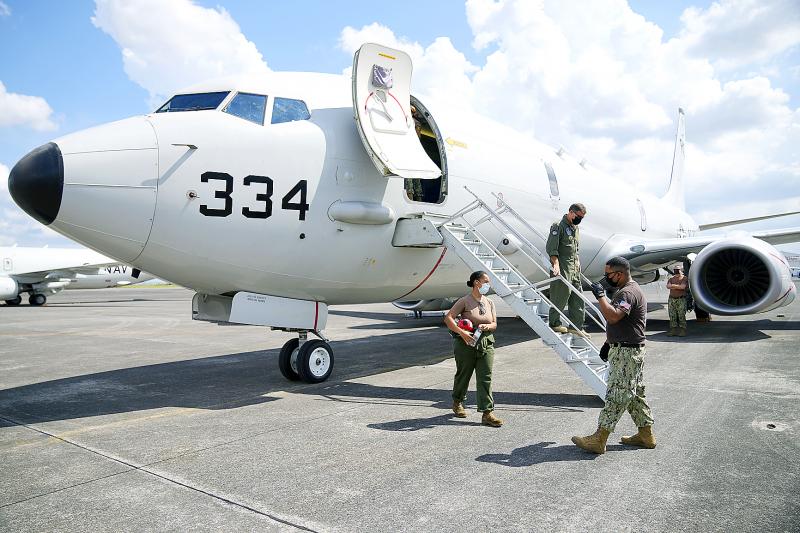The passage of a US Navy P-8A Poseidon aircraft through the Taiwan Strait on Friday was aimed at countering China’s claims to the waterway and its “systematic expansion” in the region, local military experts said.
The flight of the maritime patrol reconnaissance plane was a response to China’s assertion that the Taiwan Strait is not international waters, Institute for National Defense and Security Research analyst Su Tzu-yun (蘇紫雲) said.
It was also aimed at countering the expansion of China’s military presence in the region, for example its aircraft incursions into Taiwan’s air defense identification zone (ADIZ) and warships sailing through waters claimed by China and other countries in the South China Sea, Su said.

Photo: AP
Chinese and Russian naval vessels were also navigating Japan’s territorial waters, he added.
The US aircraft’s transit came after 29 Chinese military planes entered Taiwan’s ADIZ on Tuesday, the third-highest single-day total this year, and after Chinese Ministry of Foreign Affairs spokesman Wang Wenbin (汪文斌) told a news conference that the Taiwan Strait fell within China’s territorial waters.
The US Indo-Pacific Command said in a statement that the transit “demonstrates the United States’ commitment to a free and open Indo-Pacific,” CNN reported on Friday.
“The United States will continue to fly, sail and operate anywhere international law allows, including within the Taiwan Strait,” the statement read. “By operating within the Taiwan Strait in accordance with international law, the United States upholds the navigational rights and freedoms of all nations.”
The US’ rare move was apparently meant to counteract the harassment of Japan by Chinese and Russian ships, Institute for National Defense and Security Research analyst Shu Hsiao-huang (舒孝煌) said.
The Ministry of National Defense said that it has a full grasp of China’s military activity and has contingency measures in place to safeguard national security.
People’s Liberation Army Eastern Theater Command spokesman Colonel Shi Yi (施毅) criticized the US for “endangering the peace and stability in the Taiwan Strait” by flying the aircraft and publicizing the move.
The Eastern Theater Command had organized air and ground forces to monitor the US aircraft’s entire operation, he said.
China has stepped up its military activities near Taiwan in the past few years in response to what it sees as closer ties between Washington and Taipei.
The Democratic Progressive Party has accused Beijing of continuing to use military, diplomatic and economic means to intimidate Taiwan and neighboring countries in the Indo-Pacific region, heightening regional tensions and making no efforts to break the deadlock between the two sides.

DAREDEVIL: Honnold said it had always been a dream of his to climb Taipei 101, while a Netflix producer said the skyscraper was ‘a real icon of this country’ US climber Alex Honnold yesterday took on Taiwan’s tallest building, becoming the first person to scale Taipei 101 without a rope, harness or safety net. Hundreds of spectators gathered at the base of the 101-story skyscraper to watch Honnold, 40, embark on his daredevil feat, which was also broadcast live on Netflix. Dressed in a red T-shirt and yellow custom-made climbing shoes, Honnold swiftly moved up the southeast face of the glass and steel building. At one point, he stepped onto a platform midway up to wave down at fans and onlookers who were taking photos. People watching from inside

A Vietnamese migrant worker yesterday won NT$12 million (US$379,627) on a Lunar New Year scratch card in Kaohsiung as part of Taiwan Lottery Co’s (台灣彩券) “NT$12 Million Grand Fortune” (1200萬大吉利) game. The man was the first top-prize winner of the new game launched on Jan. 6 to mark the Lunar New Year. Three Vietnamese migrant workers visited a Taiwan Lottery shop on Xinyue Street in Kaohsiung’s Gangshan District (崗山), a store representative said. The player bought multiple tickets and, after winning nothing, held the final lottery ticket in one hand and rubbed the store’s statue of the Maitreya Buddha’s belly with the other,

Japan’s strategic alliance with the US would collapse if Tokyo were to turn away from a conflict in Taiwan, Japanese Prime Minister Sanae Takaichi said yesterday, but distanced herself from previous comments that suggested a possible military response in such an event. Takaichi expressed her latest views on a nationally broadcast TV program late on Monday, where an opposition party leader criticized her for igniting tensions with China with the earlier remarks. Ties between Japan and China have sunk to the worst level in years after Takaichi said in November that a hypothetical Chinese attack on Taiwan could bring about a Japanese

‘COMMITTED TO DETERRENCE’: Washington would stand by its allies, but it can only help as much as countries help themselves, Raymond Greene said The US is committed to deterrence in the first island chain, but it should not bear the burden alone, as “freedom is not free,” American Institute in Taiwan Director Raymond Greene said in a speech at the Institute for National Defense and Security Research’s “Strengthening Resilience: Defense as the Engine of Development” seminar in Taipei yesterday. In the speech, titled “Investing Together and a Secure and Prosperous Future,” Greene highlighted the contributions of US President Donald Trump’s administration to Taiwan’s defense efforts, including the establishment of supply chains for drones and autonomous systems, offers of security assistance and the expansion of